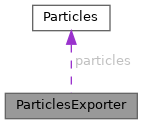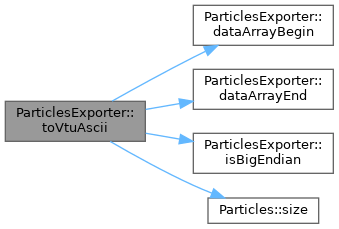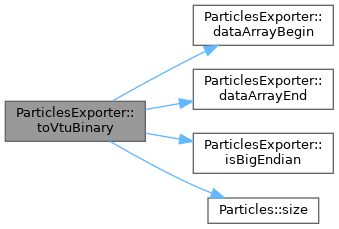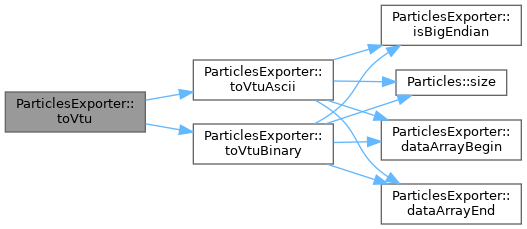#include <particles_exporter.hpp>

Public Member Functions | |
| void | setParticles (const Particles &particles) |
| Set the particles to export to a file. This method is required before exporting. | |
| void | toProf (const std::filesystem::path &path, const double &time) |
| Export the particles to a file in the Prof format. | |
| void | toVtu (const std::filesystem::path &path, const double &time, const double &n0ForNumberDensity=1.0, const bool binary=false) |
| Export the particles to a file in the VTK zlib format. | |
| void | toCsv (const std::filesystem::path &path, const double &time) |
| Export the particles to a file in the CSV format. | |
Public Attributes | |
| Particles | particles |
Private Member Functions | |
| bool | isBigEndian () const |
| detect the endian of the system | |
| std::string | dataArrayBegin (const std::string &type, const std::string &name, int numberOfComponents, const std::string &format, size_t offset=SIZE_MAX) const |
| write the header of DataArray for the VTK format | |
| std::string | dataArrayEnd () const |
| write the end of DataArray for the VTK format | |
| void | toVtuAscii (const std::filesystem::path &path, const double &time, const double &n0ForNumberDensity=1.0) |
| Export the particles to a file in the VTK zlib format. | |
| void | toVtuBinary (const std::filesystem::path &path, const double &time, const double &n0ForNumberDensity=1.0) |
| Export the particles to a file in the VTK zlib format. | |
Detailed Description
ParticlesExporter class
This class is responsible for exporting the particles to a file. It can export the particles to certain file formats. If you want to add a new file format, you can add a new method to this class. It only requires the particles (and the time) to export the particles to a file.
Definition at line 19 of file particles_exporter.hpp.
Member Function Documentation
◆ isBigEndian()
|
private |
detect the endian of the system
Some CPUs are big endian, and others are little endian. The endian of the system is detected by checking the first byte of the 32-bit integer 1. If the first byte is 0, the system is big endian.
- Returns
- if the system is big endian, return true, otherwise false
Definition at line 13 of file particles_exporter.cpp.

◆ dataArrayBegin()
|
private |
write the header of DataArray for the VTK format
- Parameters
-
type type of data (e.g., Float32, Int32) name Name of the data array numberOfComponents number of components of the data array format format of the data array (ascii, binary, appended) offset offset of the data array in the appended format
- Returns
- the header of the DataArray
Definition at line 19 of file particles_exporter.cpp.

◆ dataArrayEnd()
|
private |
write the end of DataArray for the VTK format
- Returns
- the end of the DataArray
Definition at line 44 of file particles_exporter.cpp.

◆ toVtuAscii()
|
private |
Export the particles to a file in the VTK zlib format.
- Parameters
-
path path to the file to write time current time in the simulation n0ForNumberDensity reference number density for the number density calculation
--— Points --—
--— Cells --—
Definition at line 68 of file particles_exporter.cpp.


◆ toVtuBinary()
|
private |
Export the particles to a file in the VTK zlib format.
- Parameters
-
path path to the file to write time current time in the simulation n0ForNumberDensity reference number density for the number density calculation
--— Points --—
--— Cells --—
Definition at line 182 of file particles_exporter.cpp.


◆ setParticles()
| void ParticlesExporter::setParticles | ( | const Particles & | particles | ) |
Set the particles to export to a file. This method is required before exporting.
- Parameters
-
particles
Definition at line 48 of file particles_exporter.cpp.

◆ toProf()
| void ParticlesExporter::toProf | ( | const std::filesystem::path & | path, |
| const double & | time ) |
Export the particles to a file in the Prof format.
- Parameters
-
path path to the file to write time current time in the simulation
Definition at line 52 of file particles_exporter.cpp.


◆ toVtu()
| void ParticlesExporter::toVtu | ( | const std::filesystem::path & | path, |
| const double & | time, | ||
| const double & | n0ForNumberDensity = 1.0, | ||
| const bool | binary = false ) |
Export the particles to a file in the VTK zlib format.
- Parameters
-
path path to the file to write time current time in the simulation n0ForNumberDensity reference number density for the number density calculation
Definition at line 346 of file particles_exporter.cpp.


◆ toCsv()
| void ParticlesExporter::toCsv | ( | const std::filesystem::path & | path, |
| const double & | time ) |
Export the particles to a file in the CSV format.
- Parameters
-
path path to the file to write time current time in the simulation
Definition at line 356 of file particles_exporter.cpp.


Member Data Documentation
◆ particles
| Particles ParticlesExporter::particles |
Definition at line 60 of file particles_exporter.hpp.
The documentation for this class was generated from the following files: